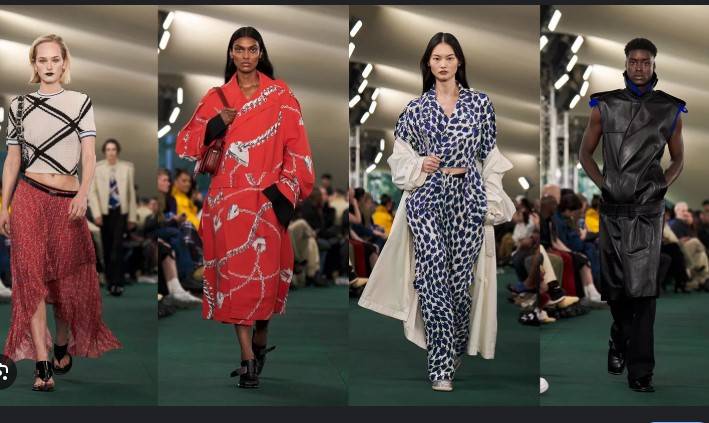London Fashion Week 2025 concluded on a rainy Monday, with British luxury giant Burberry showcasing its Autumn/Winter collection in a show that offered guests a nostalgic countryside escape. The event wrapped up a relatively subdued fashion week in the British capital, reflecting the industry’s ongoing challenges.
Creative director Daniel Lee, who has been at Burberry for just over two years, drew inspiration from “incredible British interiors.” Classic fabrics like velvet brought a luxurious touch to Burberry’s signature trench coats, tailored suits, and flowing dresses. The set, designed to evoke a traditional country house, was staged at the Tate Britain, with quilted jackets and floral skirts seamlessly blending into tapestry-covered pillars. Oversized knit sweaters added a cozy charm, perfect for a fireside evening.
Muted tones dominated the collection, with bursts of bright orange, yellow, and blue inspired by Lee’s autumn walks in Yorkshire. “It’s about those feelings of nature, tradition, and home,” Lee shared after the show. This marks Lee’s fifth collection for the British house as he continues to refine Burberry’s classic identity with a modern edge.
In a nod to British storytelling, the runway welcomed familiar faces from acclaimed royal dramas like The Crown and Downton Abbey, alongside stars from Bridgerton. Even supermodel Naomi Campbell made an appearance, as Burberry positioned itself within the wave of traditional period dramas experiencing a cultural revival.
Despite ongoing rumors suggesting that Lee might soon be replaced by designer Kim Jones, Lee dismissed the speculation. “I love the brand. It’s an incredible brand, and it’s really an honour to work for Burberry,” he said.
Burberry’s Financial Struggles Highlighted During London Fashion Week 2025
Burberry’s show came amid a tough period for the brand, which has been grappling with declining sales. As part of an “emergency” strategy initiated late last year, the company has refocused on its iconic pieces—especially the trench coat—in hopes of reviving its fortunes.
Newly appointed CEO Joshua Schulman, who took the reins last July, is leading the turnaround effort. “Josh has been here just over six months, and things are definitely improving,” Lee said optimistically. “We’re all in a really positive place right now.”
The financial challenges at Burberry mirror wider trends in the luxury industry, where brands face reduced consumer appetite for high-end goods. London Fashion Week 2025 reflected these difficulties, but there were still moments of spectacle across the four-day event.
Highlights and Challenges of London Fashion Week 2025
From a powerful monologue by Florence Pugh opening Harris Reed’s “rebellious” show to Stephen Jones’ hats crafted from chocolate, satin, and glass, London Fashion Week 2025 offered creativity despite the downbeat mood. Bubble skirts inspired by the 1980s, corsets, sheer fabrics, and a mix of tailoring and streetwear graced the runways set against dramatic London backdrops.
However, experts noted that London Fashion Week 2025 struggled to keep pace with the likes of Paris and New York. “There’s a bit of a damp spirit, an empty feeling, to the London schedule at the moment,” stylist S.S. Daley told The Guardian.
Caroline Rush, the outgoing director of the British Fashion Council, admitted it was a “particularly challenging time” for British brands. Factors like Brexit, the pandemic’s lingering impact, and the recent collapse of Matches Fashion have taken their toll on the industry.
This season was notably shorter than the previous year, with some designers opting for intimate dinners or presentations instead of costly runway shows. Influential buyers and fashion insiders, including Beka Gvishiani of Style Not Com, skipped the event altogether, while Northern Ireland’s Jonathan Anderson was also absent with his brand JW Anderson.
The Future of British Fashion
Despite the challenges, Rush maintained that London Fashion Week 2025 remains vital. “It’s so relevant because we have so many small independent businesses. They need a platform to reach global audiences,” she said as she prepared to bow out after years at the helm.
As London Fashion Week 2025 drew to a close, the event showcased both the resilience and fragility of British fashion—balancing rich heritage with the pressures of a changing global market.






